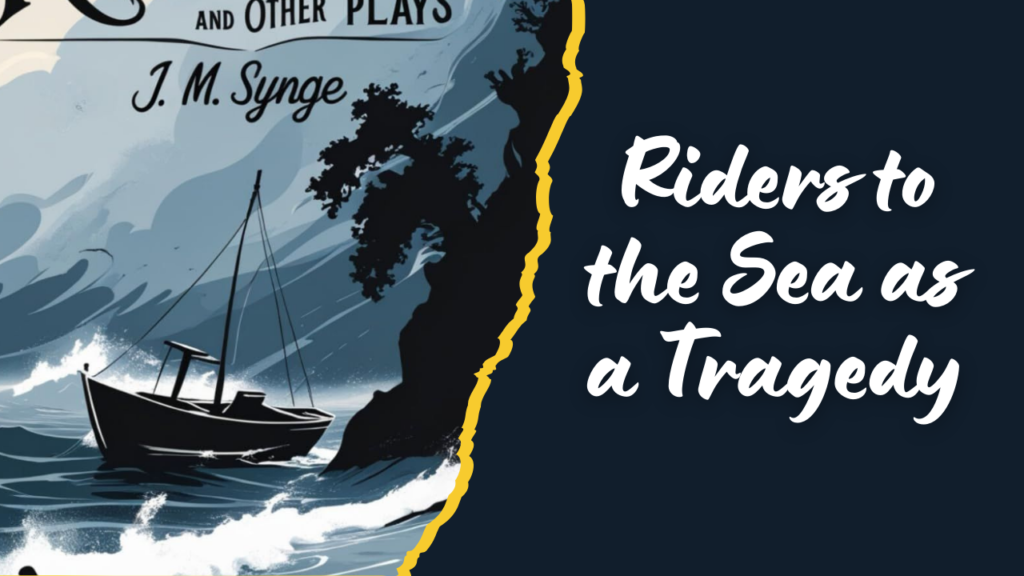W.B. Yeats said that to him, Riders to the Sea is “the finest piece of tragic work done in Ireland of late years”. On the popularity of the play, Synge himself commented that “It is a curious thing that Riders to the Sea succeeds with an English but not with an Irish audience and “The Shadows of the Glen, which is not liked by an English audience, is always liked in Ireland, though” is disliked there in theory.”
One act tragedy
The play Riders to the Sea, an one act tragedy is set in an Irishman of the Aran Islands where the sea takes a toll on the lives of common fishermen community. It is notable for capturing the rural and tragic life of the Aran community using the poetic dialect of the people. The plot is not based on the traditional conflict of human wills but on the hopeless struggle of fisher folk community against an insensitive, ruthless demonic sea.
Role of Sea
Riders to the Sea is a tragedy where Aran Islanders are unfortunate people totally at the mercy of the sea. The sea is the antagonist who mercilessly devours the riders embarking on their sail to Connemara in the mainland. The main occupation of the people was fishing. The sea acted both as their provider and annihilator. The riders are also ostensibly referred to the two sons of Maurya, the living Bartley riding the red mare with the spectre of his dead brother Michael following him on the grey pony. There is obvious reference to Poseidon, the Greek God riding the waves on his steeds as Poseidon created the horse and all horse farmers are supposed to be his servants. In Celtic mythology, the god associated with sea is Manannan Mac Lir, who represents, like Poseidon, both the ocean and the horse riding the waves. In the old Irish tale, The Voyage of Bran, the hero and his companion Manannan, after being at sea for two days and two nights when Bran sees a man coming in a chariot towards him over the sea.
Irish and Greek legends
The riders in the play can be compared to the Irish and Greek legends and heroes of the myth who ultimately meet their deaths in the end. Bartley can be compared to Bran who would meet with the ocean deity after his death. They can be indirectly referred to as the servants of Poseidon too.
Maurya, a tragic protagonist, suffers a crisis of bereavement, and her anxiety and shattered-self are evident in her speech: “I have had a husband and a husband’s father and six sons in this house, six fine men though it was the hard birth I had with everyone of them. And they coming to the world and some of them were found and some of them were not found but they are gone now the lot of them.”
Maurya is representative of every Aran woman who is left destitute of all sons by the sea. In the words of Max Beerbohm (sic), the “the theme is much the same as in Heijermans’ play The Good Hope – a mother whose youngest son is drowned, as all her sons have been drowned at sea. Mr. Synge… is content to show us the pathos of his theme, he does not, as did Heijermans, try to rouse any indignation. “so it is, and so it must be,” is his tone. “it is the tone of the mother herself, whose acquiescence is deeper than the acquiescence of the mother in The Good Hope”.
Conclusion
The title has also got undercurrent of references from the Bible. The Book of Job and the Book of Leviticus associate the title of the play to the imagery in the Book of Revelation in the Bible (vi:2) and the horses of Zechariah (1:8, vi: 2 and vi:5) which prophesy that “the riders of horses shall be confounded”. “The others, reference is to the horsemen and chariot of the Pharaoh of Egypt pursuing the Hebrews as related in the Book of Exodus in the Old Testament. Those pursuing riders were drowned in the Red sea, so there is an implication that the riders perished in the sea and that those riders were punished by Almighty God for doing wrong but in Riders to the sea, the common fishermen are only victims of a cruel sea


